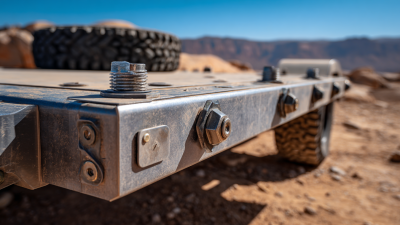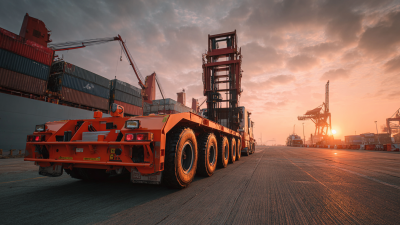Ultimate Guide to Choosing the Right Enclosed Trailers for Your Needs
Choosing the right enclosed trailers for your specific needs can be a daunting task, especially given the diverse options available on the market today. According to a recent industry report by IBISWorld, the enclosed trailer market has seen a remarkable growth of 4.2% annually, driven by increasing demand from both recreational and commercial sectors. Whether you are looking to transport valuable equipment, tools, or even vehicles, the features and specifications of the enclosed trailers you select can significantly impact your experience. In this ultimate guide, we will delve into key factors to consider, such as size, weight capacity, material, and design variations, helping you make an informed decision tailored to your unique requirements. Understanding these elements not only enhances the functionality of your trailer but also ensures that your investment meets long-term needs.

Key Factors to Consider When Choosing Enclosed Trailers for Transportation Needs
When selecting the right enclosed trailer for your transportation needs, there are several key factors to consider that can significantly affect both usability and efficiency. According to the National Association of Trailer Manufacturers, enclosed trailers are favored for their protection against weather and theft, making them ideal for transporting valuable cargo, such as vehicles and equipment. In fact, nearly 60% of businesses that rely on trailers cite increased security as a primary reason for choosing enclosed models.
Another critical factor is the trailer's weight capacity and construction material. For instance, a study from Trailer Life Magazine highlights that aluminum trailers offer superior durability and lower weight compared to their steel counterparts, which can enhance fuel efficiency during transit. Furthermore, understanding the intended uses—whether for recreational purposes or commercial transport—can guide buyers toward models that provide necessary features like additional ventilation or customizable shelving. As reported by the RV Industry Association, nearly 75% of enclosed trailer owners prioritize features that enhance operational efficiency, pointing to the importance of selecting a model that aligns with specific transport requirements.
Understanding the Different Types of Enclosed Trailers Available on the Market
When it comes to selecting the right enclosed trailer, understanding the various types available in the market is crucial for meeting your specific needs. Enclosed trailers come in several configurations, including cargo, car haulers, and custom-built units, each designed to serve distinct purposes. According to a recent industry report by the National Association of Trailer Manufacturers, the demand for enclosed trailers has surged by approximately 15% over the past year, indicating a growing interest in these versatile transport solutions.
Cargo trailers are commonly used for transporting goods securely, while car haulers are designed with added features to accommodate vehicles, such as lower deck heights and reinforced structures. Additionally, there’s a rising trend in custom-built trailers, which cater to niche markets like mobile workshops and concession stands. The same report indicates that nearly 30% of buyers are leaning towards custom options, reflecting a shift towards personalization in the trailer market. Understanding these distinctions will help buyers make informed decisions and select a model that best suits their operational needs and preferences.
Ultimate Guide to Choosing the Right Enclosed Trailers for Your Needs
| Trailer Type | Size (ft) | Weight Capacity (lbs) | Features | Best Use |
|---|---|---|---|---|
| Cargo Trailer | 12 - 28 | 1,000 - 10,000 | V-nose, ramp door, side door | General transport of goods |
| Car Hauler | 16 - 24 | 3,500 - 7,000 | Drive-on, drive-off ramp, tie-downs | Transporting cars and motorcycles |
| Motorcycle Trailer | 8 - 14 | 1,500 - 3,000 | E-track, low profile, removable wheel chocks | Transporting motorcycles |
| Cargo Expandable | 16 - 24 | 3,000 - 10,000 | Expandable side, multiple access points | For versatile storage and transport |
| Enclosed Car Trailer | 20 - 36 | 5,000 - 10,000 | Fully enclosed, reinforced structure | Protected transport for valuable cars |
Essential Features to Look for in High-Quality Enclosed Trailers
When searching for an enclosed trailer that meets your needs, it’s crucial to focus on essential features that denote high-quality construction and reliability. First and foremost, the material used in the trailer’s construction plays a significant role in its overall durability. Look for trailers made from high-grade steel or aluminum, as these materials can withstand harsh weather conditions and heavy loads, ensuring your belongings remain safe and secure. Additionally, pay attention to the thickness of the walls and flooring, as thicker materials provide better protection and insulation, making them suitable for various applications.
Another vital feature to consider is the trailer's suspension system. A good suspension system not only enhances towing performance but also ensures a smoother ride for your cargo. This is especially important if you'll be transporting valuable items or equipment. Furthermore, assess the trailer's braking system; electric brakes improve stopping efficiency and safety. Finally, ample ventilation and accessibility options, such as double rear doors or side entry doors, can significantly enhance the usability of your enclosed trailer, making your transportation experience more convenient and practical.

Top Tips for Assessing Your Load Capacity Requirements
When choosing the right enclosed trailer, one of the most critical aspects to consider is load capacity requirements. Properly assessing this factor ensures that the trailer can safely transport the items you need without exceeding limits that could compromise safety or damage cargo. According to industry standards, it's essential to calculate not only the weight of the cargo but also account for the trailer's own weight and tongue weight, which can significantly affect overall handling and stability.
For instance, a typical enclosed trailer can support a payload capacity ranging from 1,500 to 3,000 pounds. Heavy-duty options may exceed this, allowing for loads of up to 10,000 pounds or more. It’s advisable to consult manufacturer specifications and performance reports which detail optimal load distributions and weight boundaries. This becomes even more pertinent in applications involving forklifts and load handling, where adherence to safe operational rules is paramount to prevent accidents and ensure efficiency. Ensuring that your trailer meets these load capacity requirements not only aligns with safety regulations but also enhances the longevity and performance of your investment.

Maintaining Your Enclosed Trailer for Longevity and Optimal Performance
When it comes to optimizing the longevity and performance of your enclosed trailer, regular maintenance is crucial. According to the American Trucking Associations, proper trailer upkeep extends lifespan by up to 15%, significantly reducing long-term costs. Key aspects include routine inspections of tires, brakes, and lights, which are vital for safety and compliance. For instance, a report from the National Highway Traffic Safety Administration indicated that nearly 30% of trailer accidents are linked to neglecting these critical components.
Additionally, ensuring that your trailer is protected from the elements can greatly enhance its durability. A study from the Trailer Manufacturers Association suggests that trailers stored in climate-controlled environments face 40% less wear and tear compared to those left outside. Regular cleaning, including removing debris and applying protective wax to the exterior, can prevent rust and corrosion, which are common culprits in trailer degradation. By investing time in these maintenance practices, trailer owners can achieve optimal performance while safeguarding their investment for years to come.
Enclosed Trailer Maintenance and Performance Metrics
Related Posts
-

The Future of Enclosed Trailers Embracing Innovative Designs and Sustainable Practices
-

2025 Trends in Utility Trailer Parts: A Comprehensive Comparison of Quality and Performance
-

Exceptional Boat Trailer Repair Solutions from a Leading Chinese Manufacturer for Global Markets
-

Excellence in Trailer Parts Manufacturing: Bridging China’s Innovation to Global Markets
-

Unlocking the Advantages of Trailer Accessories for Enhanced Safety and Efficiency
-

Advantages of Choosing a Quality Pontoon Boat Trailer for Your Water Adventures
